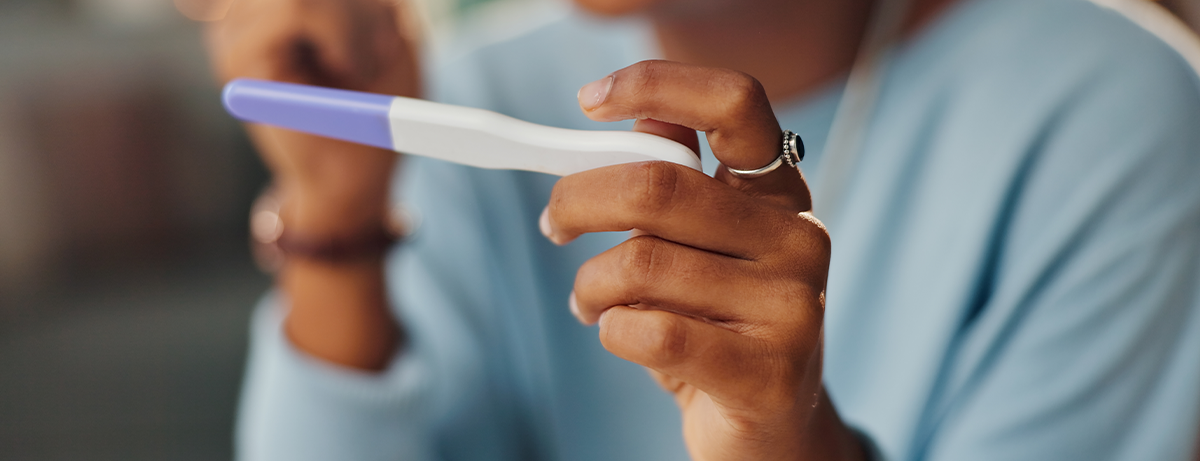15% off £25 or 20% off £35
Code:BASKET
How long does it take to get pregnant? What experts want you to know

Whether you’ve just started trying to get pregnant or are further into your journey, you might be wondering, ‘how long should this take?’ We’re here with the stats and facts
Summary
1How long does it take to get pregnant?
Most importantly, there’s no exact science. While some people may get pregnant on their first try...
2What can affect how long it takes?
Age, health and lifestyle can all play a role in how quickly you might get pregnant…
3Trying for a baby: when to see a doctor
The longer you’ve been trying, the more frustrating it can become. But try not to lose hope…
Trying for a baby can bring a range of emotions, from excitement and anticipation to frustration and anxiety. The longer it takes, the more you might feel the latter.
So, it might be reassuring to understand how long it usually takes to conceive. It can also offer an idea of the right time to seek guidance or advice from your doctor.
On average, how long does it take to get pregnant?
Most importantly, there’s no exact science. While some people may get pregnant on their first try, others can take several months or even years. Many factors may affect how quickly you conceive, such as your age and lifestyle (which we’ll cover below).1 As a general rule, you should speak to your doctor if you’ve been trying to get pregnant for over 12 months.
Most healthy couples (8 in 10) under 40 years old will get pregnant within the first year of trying if they have regular unprotected sex.1-3
‘What’s regular?’, we hear you ask. If you’re trying to get pregnant, it’s recommended you have sex every two to three days to maximise your chances of pregnancy.1-3
According to the National Institute for Health and Care Excellence (NICE), the probability of conceiving within a year (12 cycles) varies based on your age. Here’s a breakdown:4
- age 19 to 26: 92%
- age 27 to 29: 87%
- age 30 to 34: 86%
- age 35 to 39: 82%
These chances increase if you’ve been trying for two years (24 cycles):
- age 19 to 26: 98%
- age 27 to 29: 95%
- age 30 to 34: 94%
- age 35 to 39: 90%
As you can tell from these figures, fertility does decline as you age – but more on that later.
You can also maximise your chances of conceiving throughout the month by tracking when you’re most fertile.

Factors that influence how long it takes to conceive
There are a whole host of things that can affect how long it takes to get pregnant, like…
Your chances of getting pregnant decrease with age.5-7 For women, fertility gradually starts to dip around your early 30s and decreases more rapidly after the age of 35 when the number and quality of eggs decrease.5-7
For most people, the older you get, the more difficult it may be and the longer it may take to get pregnant.5 However, official stats for England and Wales do show a rising number of women over 35 having babies.5
How often and when you have sex is also crucial to getting pregnant. Having sex every two to three days, especially around ovulation, gives you the best chance of getting pregnant as quickly as possible.1
Female and male reproductive health plays a key role in how long it can take to get pregnant. For example, conditions such as polycystic ovary syndrome (PCOS) and endometriosis in women, and low sperm count in men, can make getting pregnant more challenging.1,5
Other health and lifestyle factors can also influence the time it takes to get pregnant, including:1,8,9
- being under- or overweight
- smoking
- taking recreational and illegal drugs
- taking certain medicines
- exercising too much or too little
- eating a poor diet
- drinking alcohol to excess
How long does it take to conceive after sex?
When a sperm meets an egg, fertilisation occurs, leading to pregnancy.3 Timing plays a crucial role in determining when this may happen.
Depending on when you ovulate, fertilisation may happen just hours after having sex. But it’s not always that quick – sperm can survive in the fallopian tubes for up to a week, meaning an egg can be fertilised as late as seven days following intercourse.10
Implantation is actually when pregnancy officially begins. This is when the fertilised egg attaches to the lining of your uterus, which usually begins around six days after fertilisation and takes about three to four days to complete.10
Unlike sperm, an ovulated egg only lives for 12 to 24 hours.10 This means that how long it takes for fertilisation and implantation to occur depends almost entirely on when you ovulate.
Trying for a baby: when to see a doctor
The longer you’ve been trying, the more frustrating and upsetting it can become. It can feel even more challenging when you see others getting pregnant quickly.
It’s important not to lose hope. As we’ve spoken about, many factors can influence how long it takes to get pregnant. Thankfully, most of them can be addressed with lifestyle changes and guidance from doctors. Tools like period-tracking apps and at-home fertility tests may also be helpful in your journey.
That said, it’s a good idea to get advice from your doctor if: 1
- you’re over 35 and you’ve been trying for over a year
- you’re 35 or under and you’ve been trying for over six months
- you’re worried about your fertility
- you or your partner has a health condition that affects fertility, such as PCOS
The final say
Whether you’re just starting your journey to pregnancy or are further down the road, we hope we’ve offered you some clarity and reassurance about how long it might take to see a positive pregnancy test result.
Everyone’s path to pregnancy is unique, and there are things you can do to improve your chances, from lifestyle changes at home to seeking medical advice.
Discover our guide to preparing your mind and body for pregnancy, or learn more about conditions that could affect your fertility.
While we strive for accuracy and balance, please be aware that this article may discuss products available for purchase through Holland & Barrett. Consult a healthcare professional before making any health-related decisions.
Disclaimer - This article provides informational advice and is not a substitute for medical care. Curated by experts for accuracy, we take great care to ensure the information is up-to-date and relevant. However, you should always consult your GP or healthcare professional before using supplements or alternative products, particularly if you have medical conditions or are under supervision.
1. NHS. How long does it usually take to get pregnant? [Internet]. [cited 2024 Nov 12]. Available from: https://www.nhs.uk/pregnancy/trying-for-a-baby/how-long-it-takes-to-get-pregnant/
2. Tommy’s. How long does it usually take to get pregnant? [Internet]. [cited 2024 Nov 12]. Available from: https://www.tommys.org/pregnancy-information/planning-a-pregnancy/how-to-get-pregnant/how-long-does-it-take-get-pregnant
3. NHS. Trying to get pregnant [Internet]. [cited 2024 Nov 12]. Available from: https://www.nhs.uk/pregnancy/trying-for-a-baby/trying-to-get-pregnant/
4. NICE. Fertility problems: Assessment and treatment [Internet]. [cited 2024 Nov 12]. Available from: https://www.nice.org.uk/guidance/cg156/chapter/figures-and-tables-to-support-chances-of-conception-and-embryo-quality-recommendations
5. Tommy’s. How age affects fertility [Internet]. [cited 2024 Nov 12]. Available from: https://www.tommys.org/pregnancy-information/planning-a-pregnancy/fertility-and-causes-of-infertility/how-age-affects-fertility
6. van Noord-Zaadstra BM et al. Delaying childbearing: effect of age on fecundity and outcome of pregnancy. BMJ [Internet]. 1991 Jun 8 [cited 2025 Sep 4]; 302(6789): 1361-5. Available from: https://pubmed.ncbi.nlm.nih.gov/2059713/
7. The American College of Obstetricians and Gynecologists Committee on Gynecologic Practice. Female Age-Related Fertility Decline: Committee opinion, Number 589; March 2014, Reaffirmed 2020. Available from: https://www.acog.org/clinical/clinical-guidance/committee-opinion/articles/2014/03/female-age-related-fertility-decline
8. NHS. Causes of infertility [Internet]. [cited 2024 Nov 12]. Available from: https://www.nhs.uk/conditions/infertility/causes/
9. NICHD - Eunice Kennedy Shriver National Institute of Child Health and Human Development. What lifestyle and environmental factors may be involved with infertility in females and males? [Internet]. [cited 2024 Nov 12]. Available from: https://www.nichd.nih.gov/health/topics/infertility/conditioninfo/causes/lifestyle
10. NHS. Periods and fertility in the menstrual cycle [Internet]. [cited 2024 Nov 12]. Available from: https://www.nhs.uk/conditions/periods/fertility-in-the-menstrual-cycle/












